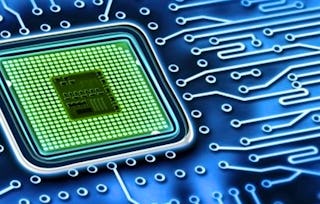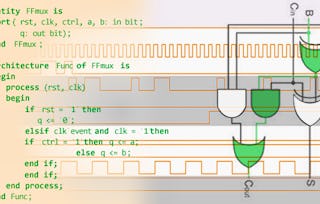This course is designed to provide a comprehensive understanding of digital circuit design using VHDL programming with Xilinx ISE. Participants will learn the fundamentals of VHDL, simulation modeling, and design methodologies for digital circuits, including combinational and sequential circuits. Practical exercises using Xilinx ISE will enhance hands-on skills in circuit implementation, simulation, and analysis.

Design of Digital Circuits with VHDL Programming
Ends soon: Gain next-level skills with Coursera Plus for $199 (regularly $399). Save now.

Design of Digital Circuits with VHDL Programming
This course is part of Chip based VLSI design for Industrial Applications Specialization

Instructor: Subject Matter Expert
4,692 already enrolled
Included with
(19 reviews)
Recommended experience
Skills you'll gain
- Integrated Development Environments
- Electronics
- Development Environment
- Simulation and Simulation Software
- Application Specific Integrated Circuits
- Field-Programmable Gate Array (FPGA)
- Electrical and Computer Engineering
- Electronic Systems
- Computer Engineering
- Design Software
- Electronic Hardware
- Schematic Diagrams
- Embedded Systems
- Verification And Validation
- Electronics Engineering
- Dataflow
- Computational Logic
- Hardware Design
Details to know

Add to your LinkedIn profile
4 assignments
See how employees at top companies are mastering in-demand skills

Build your subject-matter expertise
- Learn new concepts from industry experts
- Gain a foundational understanding of a subject or tool
- Develop job-relevant skills with hands-on projects
- Earn a shareable career certificate

There are 4 modules in this course
This module provides a comprehensive introduction to VHDL (VHSIC Hardware Description Language) programming, focusing on digital circuit design and simulation. Participants will learn about VHDL design elements, data objects, modeling styles, delay type modeling, operators, concurrent statements, process statements, subprograms, data flow description, behavioral description, attributes, and logic operations. The module aims to simplify VHDL programming concepts and techniques, making it accessible for beginners and providing a strong foundation for digital circuit design using VHDL.
What's included
16 videos5 readings1 assignment
This module provides a comprehensive exploration of digital combinational circuits design using VHDL programming within the Xilinx ISE Design Suite environment. Participants will delve into fundamental concepts such as AND gates, half adders, full adders, multiplexers, demultiplexers, encoders, decoders, comparators, barrel shifters, and binary-to-BCD and binary-to-Gray code converters. The module covers various VHDL modeling styles including structural, dataflow, and behavioral modeling, enabling a deep understanding of circuit design and simulation.
What's included
51 videos1 assignment
This module focuses on the design and implementation of digital sequential circuits using VHDL programming within the Xilinx ISE-I environment. Participants will delve into fundamental sequential circuit components such as D latch, D flip-flop, SR flip-flop, JK flip-flop, T flip-flop, shift registers, counters, and FIFO memories. Various VHDL modeling styles including structural, dataflow, and behavioral modeling will be utilized to develop and analyze the functionality of these sequential circuits.
What's included
20 videos1 assignment
This module delves into the design and implementation of digital sequential circuits using VHDL programming techniques within the Xilinx ISE-II environment. Participants will explore various sequential circuit components such as Single Port RAM, Dual Port RAM, sequence detectors (including Mealy and Moore machines), and a digital model of a vending machine. The module emphasizes hands-on learning, combining theoretical concepts with practical design and simulation exercises to develop a comprehensive understanding of digital sequential circuit design methodologies.
What's included
23 videos1 assignment
Earn a career certificate
Add this credential to your LinkedIn profile, resume, or CV. Share it on social media and in your performance review.
Instructor

Offered by
Explore more from Electrical Engineering
 Status: Free Trial
Status: Free Trial Status: Free Trial
Status: Free Trial Status: Preview
Status: PreviewUniversitat Autònoma de Barcelona
 Status: Preview
Status: PreviewUniversity of Illinois Urbana-Champaign
Why people choose Coursera for their career




Learner reviews
19 reviews
- 5 stars
68.42%
- 4 stars
10.52%
- 3 stars
0%
- 2 stars
10.52%
- 1 star
10.52%
Showing 3 of 19
Reviewed on Jun 11, 2025
This course is amazing to start the VLSI Domain journey.
Frequently asked questions
To access the course materials, assignments and to earn a Certificate, you will need to purchase the Certificate experience when you enroll in a course. You can try a Free Trial instead, or apply for Financial Aid. The course may offer 'Full Course, No Certificate' instead. This option lets you see all course materials, submit required assessments, and get a final grade. This also means that you will not be able to purchase a Certificate experience.
When you enroll in the course, you get access to all of the courses in the Specialization, and you earn a certificate when you complete the work. Your electronic Certificate will be added to your Accomplishments page - from there, you can print your Certificate or add it to your LinkedIn profile.
Yes. In select learning programs, you can apply for financial aid or a scholarship if you can’t afford the enrollment fee. If fin aid or scholarship is available for your learning program selection, you’ll find a link to apply on the description page.
More questions
Financial aid available,





